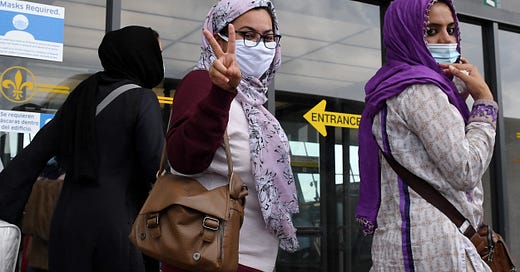The Establishment's Afghanistan Myths
Joe Biden is being scapegoated for two decades of dishonest bipartisan policy
Richard N. Haass is president of the Council on Foreign Relations and thus as emblematic a representative of the American national security establishment as one could want. On Friday, he commented about the ongoing turmoil in Afghanistan, “The alternative to withdrawal from Afghanistan was not ‘endless occupation’ but open-ended presence. Occupation is imposed, presence invited. Unless you think we are occupying Japan, Germany, & South Korea. And yes, withdrawal was the problem.”
Haas’ comments are a crisp distillation of the emerging establishment consensus on Afghanistan in the wake of the rapid collapse of the American-supported government. One sees this point of view among not just among the familiar hawks but also mainstream foreign policy analysts and journalists. In advancing this consensus, ghouls who should have been discredited for their advocacy have been dug up and given prominent platforms: not just John Bolton and Paul Wolfowitz but even that ultimate undying security state vampire, Henry Kissinger.
The basic argument goes something like this: Until Joe Biden came along, Afghanistan was a manageable problem. It was on path to becoming a Japan, Germany or South Korea, a country that would have a permanent American military presence under stable conditions with little or no loss of military life. As I pointed out in a previous post, this argument ignores the actual reality that that Afghanistan has never been stable since the American invasion and has been the continuous site of a brutal civil war (one that predates the American intervention). To speak of an “open-ended presence” is to ignore the massive loss of civilian live has accompanied the war of the last twenty years (and the earlier civil war).
But there are further points to be made about this establishment myth. It is clearly designed to scapegoat Joe Biden for problems that are not caused by the withdrawal but are in fact inherent in bipartisan policy going back two decades in four administrations.
To gauge how fantastical the establishment party line is, it is worth reading “The Afghanistan Papers,” a blockbuster Washington Post report by journalist Craig Whitlock that ran in 2019 (which will soon be available in expanded form as a book set to be released next week). Unfortunately, “The Afghanistan Papers” were largely ignored by the rest of the media and by the political elite. Yet it stands as the best and most clear-cut account of the failed American war.
Based on an internal Pentagon autopsy on the Afghanistan war that relied on hundreds of interviews, Whitlock’s report makes clear that the Afghan government that the United States created in 2001 was always a fiction: it was a Potemkin regime that could only survive with American support. The Afghan army itself was a servile creation that had no ability or will to fight on its own.
The swift collapse of the American satellite state in Afghanistan only serves to vindicate Whitlock’s superb journalism.
A key part of “The Afghanistan Papers” tells us:
Year after year, U.S. generals have said in public they are making steady progress on the central plank of their strategy: to train a robust Afghan army and national police force that can defend the country without foreign help.
In the Lessons Learned interviews, however, U.S. military trainers described the Afghan security forces as incompetent, unmotivated and rife with deserters. They also accused Afghan commanders of pocketing salaries — paid by U.S. taxpayers — for tens of thousands of “ghost soldiers.”
None expressed confidence that the Afghan army and police could ever fend off, much less defeat, the Taliban on their own. More than 60,000 members of Afghan security forces have been killed, a casualty rate that U.S. commanders have called unsustainable.
None of this is meant to exonerate the Biden administration for mistakes made in the withdrawal. The fact that that many American allies in the country won’t be able to leave and gain refugee status is a stain on America’s national honour. The Biden administration should be pressed to accept more refugees. The violence and chaos of the withdrawal should be investigated.
Biden can also be criticized for being part of the foreign policy consensus that maintained the war for many years, although he himself deserves credit for arguing for a partial withdrawal as early as 2009.
But the larger point is that the debacle is not the fault of any one person but an entire national security establishment. In creating the myth that “withdrawal was the problem” that establishment is white-washing its own disastrous legacy. The Afghanistan war was a failure from the start. We need accountability for the architects of that failure, not a new myth to salvage their reputation.
Share and Subscribe
If you liked this post, please share:
Or subscribe:





I only caught bits and pieces of Whitlock's series when it was running, and it was so entirely spot on in relation to the facts as I knew them, that I thought it was obvious to everyone. "Potemkin regime". That fits...